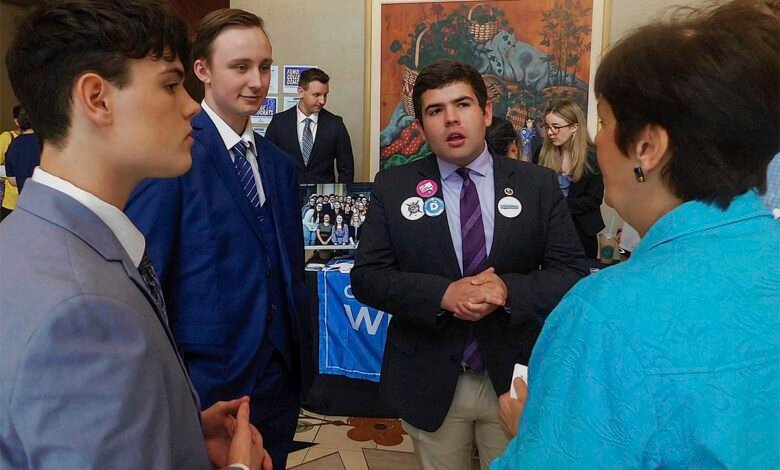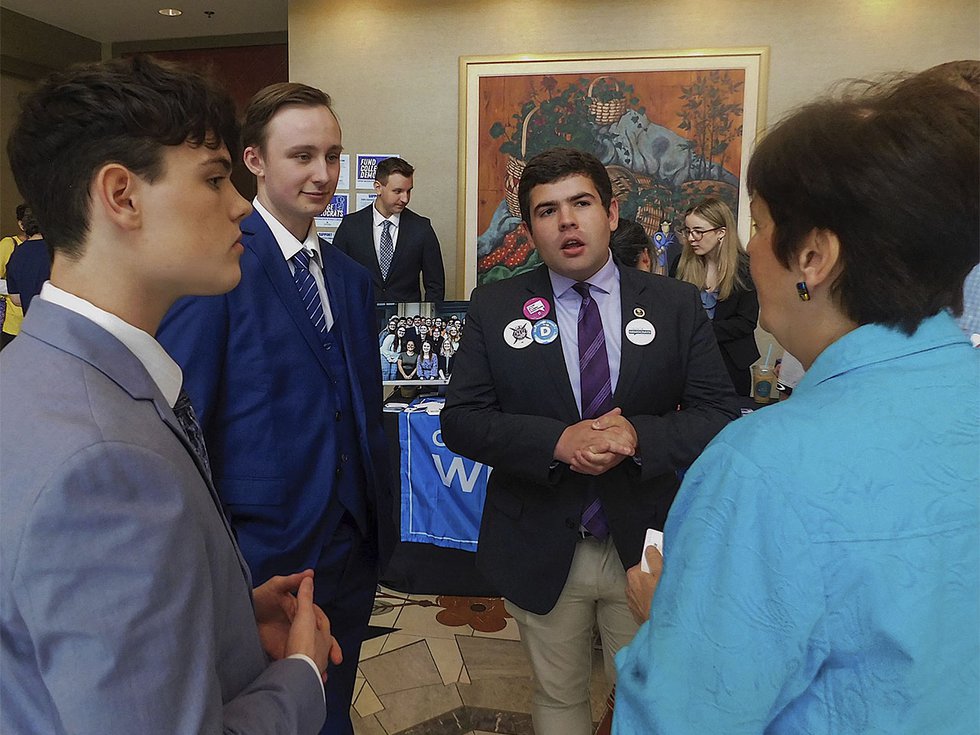Wisconsin College Democrats push Biden to adopt stronger policy toward Israel – Isthmus


Democratic voters dissatisfied with President Joe Biden’s position on the war in Gaza pose an electoral threat to the incumbent, particularly in battleground states like Wisconsin. That has not been lost on organizers charged with rallying young voters behind the Democratic nominee for the November election.
“I came to the conclusion that as chair, my job would be impossible going into November to try to sell the choice of Joe Biden to many young people if we didn’t come out and call for a ceasefire,” Matthew Lehner, a UW-Eau Claire student and chair of the College Democrats of Wisconsin, tells Isthmus.
The organization called for a permanent ceasefire in Gaza on April 29 as pro-Palestinian student protesters at UW-Madison and UW-Milwaukee began encampments on their universities’ grounds. Lehner says the decision to release a statement has been met with limited backlash, but not from “party upper echelons,” who he said respect College Democrats of Wisconsin’s independence.
By calling for a permanent ceasefire, Lehner and the College Democrats of Wisconsin joined a number of progressive organizations in encouraging the Biden administration to rethink its relationship with Israel. On June 8, some of those organizations scored a win at the state Democratic convention: Despite a recommendation from the party’s platform committee to reject a resolution calling for an “immediate, unconditional ceasefire” in the region, the measure passed 135-91. The College Democrats of UW-Madison signed on in support of the resolution.
Lehner says the overwhelming support for the measure at the convention “helps us as well.”
Though it’s not a top issue for most voters, the war in Gaza and the Biden administration’s response has alienated some people who typically vote Democratic. In 2020, Biden won Wisconsin by 20,600 votes. In the April 2024 Democratic primary, 48,162 Wisconsinites voted for the “uninstructed delegation” option on their ballots, more than doubling the 20,000 vote target set by Listen to Wisconsin, an organization which encouraged Wisconsinites opposing the Biden administration’s policy in Gaza to vote uninstructed.
Given Wisconsin’s historically slim margins in the presidential election, those numbers might give the Biden campaign reason for pause.
“It’s quite possible for even a small group that’s unhappy with what’s happening in Gaza to be decisive,” Barry Burden, director of UW-Madison’s Election Research Center, tells Isthmus. He notes that in 2016 and 2020, the state-winner presidential nominees both won with fewer than 25,000 votes.
The strength of pro-Palestine activism is more prominent in college towns, Burden says, because they offer high concentrations of students in close proximity and plenty of available spaces, like campus lawns or buildings, for advocacy. Administrative crackdowns on encampments and protests, as what transpired at UW-Madison’s pro-Palestinian encampment on May 1, could further make people “committed” to protest activity, Burden says. In Madison, nearly 32% of voters in the 20 wards on or near campus voted uninstructed in the April Democratic primary, compared to 14.6% in Dane County overall, according to UW-Madison student newspaper The Daily Cardinal.
Organizers at universities are taking note. For Whitman Bottari, communications director of the College Democrats of UW-Madison, the gap between the Biden administration’s policy in Gaza and young voters’ expectations provides an opportunity to advocate for students.
“We’re trying to help Biden by urging him to rethink a position that’s unpopular with a lot of young voters,” Bottari says, adding that doing so is the “opposite of an anti-Biden position.” She calls the campus wards’ high levels of uninstructed votes “a message to the president that he should support a ceasefire” and notes that a potential Biden win in Wisconsin would likely be by a margin less than UW-Madison’s total student population of more than 48,000.
Those slim numbers are a strategic boon for organizers with Listen to Wisconsin, the group behind the state’s uninstructed movement. Halah Ahmad, the organization’s spokesperson, says that even if young voters do not view the war in Gaza as their top issue, their engagement with pro-Palestininan organizing shows why the Biden administration should pursue a stronger policy in Gaza. Ahmad says the high uninstructed turnout in the April primary “was a resounding message to the administration that this is serious.”
“[Young voters] are the voters that have swung elections, in past cycles, in recent history,” Ahmad says. “There’s a lot of them that are very disaffected by this issue as a sort of cherry on top of all their other disappointments with the Biden administration.”
Lehner acknowledges that the uninstructed numbers are a concern. But he feels that the Biden administration has recently taken a stronger stance toward Israel by calling for a conditional permanent ceasefire and “holding Netanyahu accountable.” He says the College Democrats of Wisconsin hope to communicate to young voters that former president Donald Trump would only worsen the crisis in Gaza if elected. Both Lehner and Bottari note, additionally, that other issues young voters care about, including climate change and student loan forgiveness, are still at play in the election.
“You may not agree with Joe Biden on every issue and in the way and the steps he has handled this situation,” Lehner says. “I understand that and in many ways stand with you and agree with you on that. But at the same time, if you elect Donald Trump you will have no progress on the Gaza issue.”
Biden’s support for Israel’s war effort and his relationship with the country’s prime minister, Benjamin Netanyahu, has become more frayed over time. Biden publicly proclaimed on May 8 that the United States would stop supplying some weapons to Israel if it invades Rafah, the southern Gaza city in which more than a million displaced Palestinians have sheltered. Despite Israeli attacks forcing an estimated one million Palestinians to flee from Rafah, according to a United Nations press briefing on June 6, the White House maintains that Israel’s ground and air offensive has not crossed Biden’s “red line.”
Hamas’ Oct. 7 attack on Israel killed nearly 1,200 people, according to the Israeli government. The resulting Israeli offensive in Gaza and ongoing humanitarian crisis in the region has killed over 37,000 people, according to the latest numbers from Gaza’s health ministry.
A Gallup poll conducted in March indicates that 56% of Americans and 75% of Democrats disapprove of Israel’s actions in Gaza. Polls show that young voters are more likely to be critical of Israel — a Pew Research Center poll published in April says that only 16% of adults under 30 “favor the U.S. providing military aid to Israel to help in its war against Hamas.”
Finding agreement on a strategy on Israel is an ongoing challenge for Democratic Party leadership, Burden says. Burden says that it is unlikely that the Biden administration would adopt a policy platform on Gaza that fully meets protesters’ demands, which he called “a pretty major change in U.S. policy.”
“Democrats have tried to bring their coalition together and avoid splintering by having votes in Congress, for example, both condemning antisemitism and calling for an end to the conflict and trying to push the Biden administration to be more aggressive with Israeli leaders about winding up the conflict soon,” Burden says. “But there’s not going to be a policy that makes everyone in the party happy. There are just too many different views.”
Lehner recognizes that the Democratic Party is a “big tent” that includes people who can disagree on issues. Still, Lehner feels that young people have already had success in calling for a stronger policy on Gaza. He says that’s partially as a result of Democratic Party leadership recognizing young voters’ importance, particularly after the widespread campus protests.
“The Democratic Party realizes, although they may not admit it all the time, that they need young people in this election,” Lehner says. “Joe Biden won the state by just over 20,000 votes in 2020. Campuses across our state are the margin of victory.”
He feels that he is able to give an increasingly better answer to young voters asking about Gaza.
“The answer has gotten better, given the fact that we passed this resolution this past weekend, and I hope it continues to get better,” Lehner says. “I’m pleased at the efforts that the Biden administration has been making towards securing peace in the Middle East, and towards better communicating on this issue, because frankly, it’s long overdue.”

